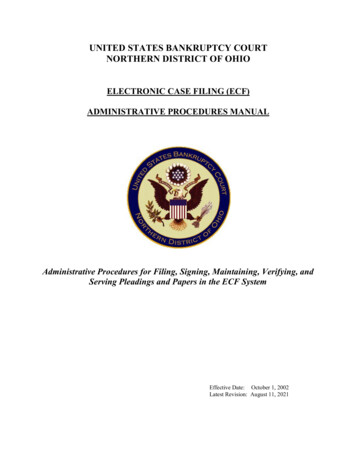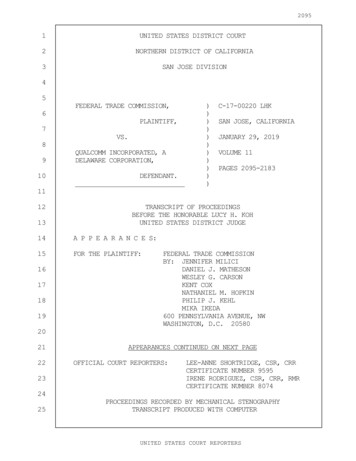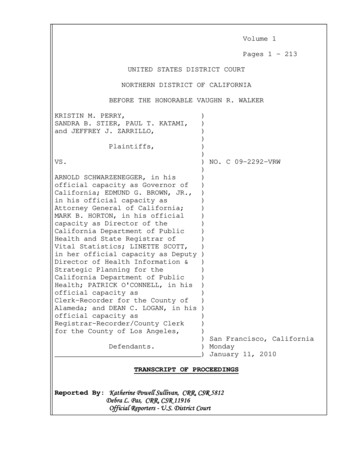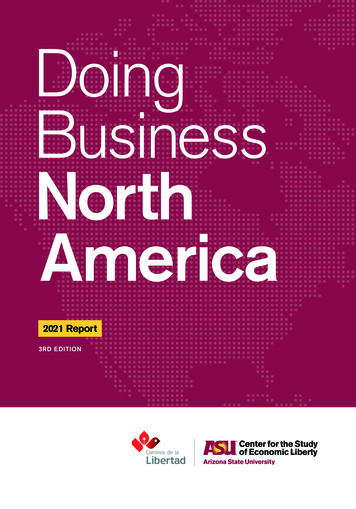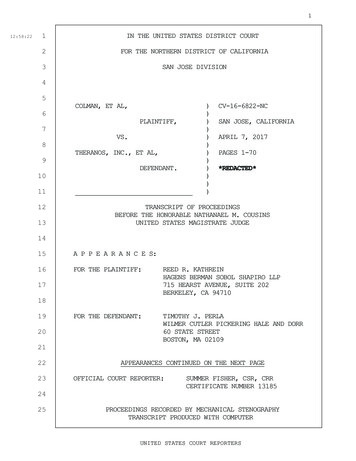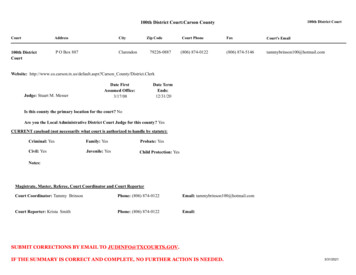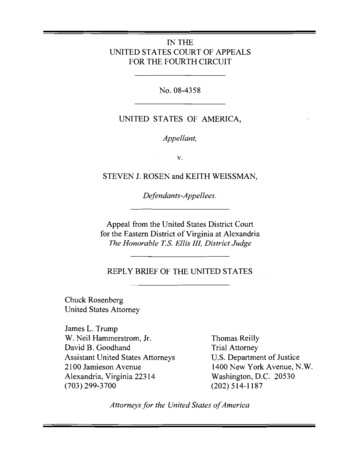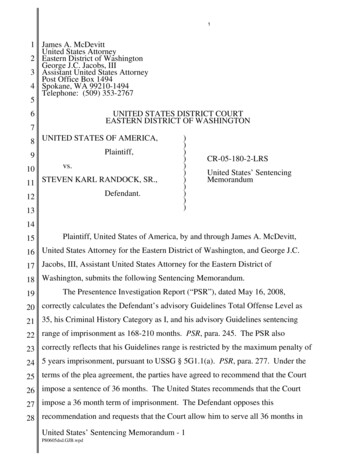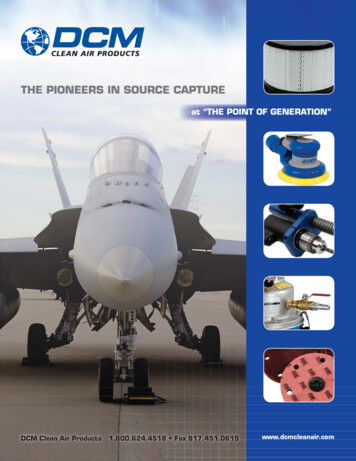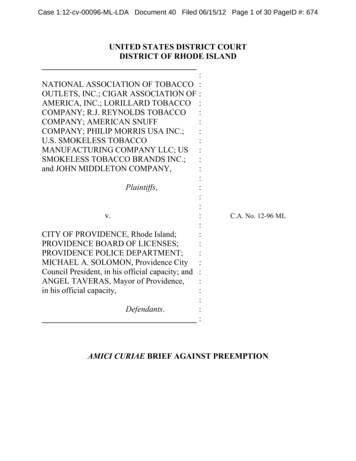
Transcription
Case 1:12-cv-00096-ML-LDA Document 40 Filed 06/15/12 Page 1 of 30 PageID #: 674UNITED STATES DISTRICT COURTDISTRICT OF RHODE ISLAND:NATIONAL ASSOCIATION OF TOBACCO :OUTLETS, INC.; CIGAR ASSOCIATION OF :AMERICA, INC.; LORILLARD TOBACCO :COMPANY; R.J. REYNOLDS TOBACCO:COMPANY; AMERICAN SNUFF:COMPANY; PHILIP MORRIS USA INC.;:U.S. SMOKELESS TOBACCO:MANUFACTURING COMPANY LLC; US :SMOKELESS TOBACCO BRANDS INC.;:and JOHN MIDDLETON COMPANY,::Plaintiffs,:::v.:C.A. No. 12-96 ML:CITY OF PROVIDENCE, Rhode Island;:PROVIDENCE BOARD OF LICENSES;:PROVIDENCE POLICE DEPARTMENT;:MICHAEL A. SOLOMON, Providence City :Council President, in his official capacity; and :ANGEL TAVERAS, Mayor of Providence,:in his official capacity,::Defendants.::AMICI CURIAE BRIEF AGAINST PREEMPTION
Case 1:12-cv-00096-ML-LDA Document 40 Filed 06/15/12 Page 2 of 30 PageID #: 675CORPORATE DISCLOSURE STATEMENTNo party to this filing has a parent corporation, and no publicly heldcorporation owns 10% or more of the stock of any of the parties to this filing.ii
Case 1:12-cv-00096-ML-LDA Document 40 Filed 06/15/12 Page 3 of 30 PageID #: 676TABLE OF CONTENTSINTEREST OF AMICI CURIAE . 1INTRODUCTION AND SUMMARY OF ARGUMENT . 2ARGUMENT . 31. There is a strong presumption against federal preemption of theseProvidence Ordinances protecting health and safety . 32. The FSPTCA does not preempt Providence’s Flavored TobaccoOrdinance. . 7A.The Preservation Clause . 8B.The Preemption Clause. 9C.The Savings Clause . 93. The FLCAA does not preempt Providence’s Flavored TobaccoOrdinance. .134. The FSPTCA does not preempt Providence’s Price Ordinance .135. The FLCAA does not preempt Providence’s Price Ordinance.166. Rhode Island law does not preempt Providence’sPrice Ordinance .19CONCLUSION.22iii
Case 1:12-cv-00096-ML-LDA Document 40 Filed 06/15/12 Page 4 of 30 PageID #: 677TABLE OF AUTHORITIESCasesAltria Grp. v. Good555 U.S. 70 (2008). 3Amico’s Inc. v. Mattos,789 A.2d 899 (R.I. 2002) . .19, 21Austin v. Tennessee,179 U.S. 343 (1900). 4Barnett Bank v. elson,517 U.S. 25 (1996). 4, 5Brown v. Gardner,513 U.S. 115(1994).20Building & Constr. Trades Council v. Associated Builders & Contractors ofMass./R. I., Inc.,507 U.S. 218 (1993). 4Cal. Div. of Labor Standards Enforcement v. Dillingham Constr. . A., Inc.,519 U.S. 316 (1997).20Camps ewfound/Owatonna, Inc. v. Town of Harrison,520 U.S. 564 (1997).20Cipollone v. Liggett Group Inc.,505 U.S. 504 (1992). 4, 6, 18Commonwealth Brands, Inc. v. United States,678 F. Supp.2d 512 (W.D. Ky.2010) .18Desiano v. Warner-Lambert & Co.,467 F.3d 85 (2d Cir. 2007) . 3English v. General Elec. Co.,496 U.S. 72 (1990). 5iv
Case 1:12-cv-00096-ML-LDA Document 40 Filed 06/15/12 Page 5 of 30 PageID #: 678Florida Lime & Avocado Growers, Inc. v. Paul,373 U.S. 132 (1963). 6Hillsborough County, Fla. v. Automated Med. Labs., Inc.,471 U.S. 707 (1985). 3Hines v. Davidowitz,312 U.S. 52 (1941). 6International Paper Co. v. Ouellette,479 U.S. 481(1987). 5Jones v. Rath Packing Co.,430 U.S. 519 (1977). 4, 5, 21Jones v. Vilsack,272 F.3d 1030 (8th Cir. 2001) .17Lorillard Tobacco Co. v. Reilly,533 U.S. 525 (2001). 3, 13, 16Medtronic, Inc. v. Lohr,518 U.S. 470 (1996). 3Metropolitan Life Ins. Co. v. Massachusetts,471 U.S. 724 (1985). 3ational Meat Ass’n. v. Harris,U.S. , 132 S.Ct. 965 (2012) . 12, 13O'Melveny & Myers v. FDIC,512 U.S. 79 (1994).20Packer Corp. v. Utah,285 U.S. 105 (1932). 3Philip Morris Inc. v. Harshbarger,122 F.3d 58 (1st Cir. 1997). 7v
Case 1:12-cv-00096-ML-LDA Document 40 Filed 06/15/12 Page 6 of 30 PageID #: 679Rice v. Santa Fe Elevator Corp.,331 U.S. 218 (1947). 6, 21Rockword v. City of Burlington,21 F. Supp.2d 411(D. Vt. 1998) .17Schafer v. American Cyanamid Co.,20 F.3d 1 (1994) .20Town of East Greenwich v. arragansett Electric Co.,651 A.2d 725 (R. I. 1994) .21U.S. Smokeless Tobacco Mfg. Co. v. City of ew York,703 F. Supp.2d 329 (S.D.N.Y. 2010) . 4, 12U.S. Smokeless Tobacco Mfg. Co. v. City of ew York,09 Civ. 10511 (CM),2011 U.S. Dist. LEXIS 133018, *4 (S.D.N.Y. 2011) . .9, 10, 12, 21Verizon ew England Inc. v. Rhode Island Pub. Utils.,822 A.2d 187 (R.I. 2003) . 6Statutes & OrdinancesFamily Smoking Prevention and Tobacco Control Act (the “FSPTCA”),123 Stat. 1776, as amended, 21 U.S.C. § 387 et seq. . passimFederal Cigarette Labeling and Advertising Act (the “FCLAA”),79 Stat. 282, as amended, 15 U.S.C. § 1331 et seq. . passimProvidence Code of Ordinances §§ 14-300, 14-303(“Price Ordinance”) . passimProvidence Code of Ordinances §§ 14-308, 14-309(“Flavored Tobacco Ordinance”) . passimvi
Case 1:12-cv-00096-ML-LDA Document 40 Filed 06/15/12 Page 7 of 30 PageID #: 680INTEREST OF AMICI CURIAEAmici1 are non-profit public health organizations and advocacy groups whohave worked for decades to protect the public from the devastating dangers oftobacco use—the leading cause of preventable death in America.2As Providence’s Flavored Tobacco Ordinance and Price Ordinanceregulating sales of tobacco products will help prevent children from beginning touse these products as well as help adults quit, Amici have a strong interest inensuring that these traditional health-and-safety regulations are not defeated by the1These Amici are AMERICAN ACADEMY OF PEDIATRICS-RI CHAPTERS; AMERICANCANCER SOCIETY CANCER ACTION NETWORK; AMERICAN CANCER SOCIETY,NEW ENGLAND DIVISION, INC.; AMERICAN LUNG ASSOCIATION; AMERICANLUNG ASSOCIATION IN RHODE ISLAND; CAMPAIGN FOR TOBACCO-FREE KIDS;CENTER FOR HISPANIC POLICY AND ADVOCACY (CHISPA); CHARIHO TRI-TOWNTASK FORCE ON SUBSTANCE ABUSE PREVENTION; CODAC BEHAVIORALHEALTHCARE; DISCOVERY HOUSE; FAMILY SERVICE OF RHODE ISLAND;INITIATIVES FOR HUMAN DEVELOPMENT; INTERNATIONAL INSTITUTE OF RHODEISLAND; JOHN HOPE SETTLEMENT HOUSE; MEETING STREET; NATIONALASSOCIATION OF COUNTY AND CITY HEALTH OFFICIALS; NATIONALASSOCIATION OF LOCAL BOARDS OF HEALTH; RHODE ISLAND COLLEGE SCHOOLOF NURSING; RHODE ISLAND MEDICAL SOCIETY; RHODE ISLAND PUBLICHEALTH INSTITUTE; RHODE ISLAND STATE NURSES ASSOCIATION;SOCIOECONOMIC DEVELOPMENT CENTER FOR SOUTHEAST ASIANS; THEPROVIDENCE CENTER; UNIFIED INSIGHT CONSULTING; URBAN LEAGUE OFRHODE ISLAND; and YOUTH PRIDE INC.“Cigarette smoking causes about 1 out of every 5 deaths in the United States eachyear. . . . 443,000 deaths annually (including deaths from secondhand smoke).”http://www.cdc.gov/tobacco/data statistics/fact sheets/health effects/tobacco related mortality. Not including deaths from secondhand smoke, cigarette smoking isestimated to be responsible for 1,695 deaths per year in the state of Rhode Islandalone. Source: Centers for Disease Control and Prevention. State-SpecificSmoking-Attributable Mortality and Years of Potential Life Lost - United States,2000-2004. MMWR 2009; 58(2):29-33.21
Case 1:12-cv-00096-ML-LDA Document 40 Filed 06/15/12 Page 8 of 30 PageID #: 681Tobacco-Company Plaintiffs’ preemption arguments to gut reasonable restrictionson the sale of tobacco. Hence, Amici respectfully file this brief against preemption.INTRODUCTIONIn deciding the Tobacco-Company Plaintiffs’ preemption arguments, theCourt is presented with two straightforward issues: The Tobacco-Company Plaintiffs argue that Providence’s ordinancesregulating sales of flavored tobacco products and prohibiting sales oftobacco products at a coupon discount are preempted by the FamilySmoking Prevention and Tobacco Control Act (FSPTCA) and the FederalCigarette Labeling and Advertising Act (FCLAA). But the FSPTCA’sPreservation and Savings Clauses, and the FLCAA’s new Savings Clause atSection 1334(c), authorize Providence to do exactly what it did throughthese ordinances—regulate sales of tobacco products. Do the FSPTCA andFCLAA preempt these local sales ordinances? The Tobacco-Company Plaintiffs argue that because the General Assembly“considered but declined” to enact sales regulations like Providence’sFlavored Tobacco and Price Ordinances, the General Assembly by inactionsilently preempted the entire field regulating sales of tobacco products. Butthe few Rhode Island statutes that Plaintiffs raise do not regulate sales offlavored tobacco to all people (like the Flavored Tobacco Ordinance does)and do not prohibit retailers from selling tobacco products at a coupondiscount (like the Price Ordinance does). Does Rhode Island law impliedlypreempt this field?2
Case 1:12-cv-00096-ML-LDA Document 40 Filed 06/15/12 Page 9 of 30 PageID #: 682ARGUMENT1.There is a strong presumption against federal preemption of theseProvidence Ordinances protecting health and safety.Because the states are independent sovereigns in our federalist system whotraditionally regulate health and safety, there is a strong presumption againstfederal preemption of state or local health and safety regulations that is notovercome unless preemption is “the clear and manifest purpose of Congress.”Altria Grp. v. Good, 555 U.S. 70, 77-78 (2008); Lorillard Tobacco Co. v. Reilly,533 U.S. 525, 541-42 (2001); (“the historic police powers of the States are not tobe superseded by the Federal Act unless that is the clear and manifest purpose ofCongress”); Medtronic, Inc. v. Lohr, 518 U.S. 470, 485 (1996)(same); Desiano v.Warner-Lambert & Co., 467 F.3d 85, 94 (2d Cir. 2007) (regulation of “matters ofhealth and safety . . . is a sphere in which the presumption against preemptionapplies, indeed, stands at its strongest”).Throughout the history of our Republic, “[s]tates traditionally have had greatlatitude under their police powers to legislate as to the protection of the lives,limbs, health, comfort, and quiet of all persons.” Metropolitan Life Ins. Co. v.Massachusetts, 471 U.S. 724, 756 (1985). Indeed, the “regulation of health andsafety matters is primarily, and historically, a matter of local concern.”Hillsborough County, Fla. v. Automated Med. Labs., Inc., 471 U.S. 707, 719(1985) (emphasis added); Packer Corp. v. Utah, 285 U.S. 105, 108 (1932) (“It is3
Case 1:12-cv-00096-ML-LDA Document 40 Filed 06/15/12 Page 10 of 30 PageID #: 683not denied that the State may, under police power, regulate the business of sellingtobacco products”); Austin v. Tennessee, 179 U.S. 343, 348-49 (1900) (“[W]e thinkit within the province of the [state] legislature to say how far [cigarettes] may besold or to prohibit their sale entirely. . . .”); see also U.S. Smokeless Tobacco Mfg.Co. v. City of ew York, 703 F. Supp.2d 329, 333 (S.D.N.Y. 2010) (“[t]heregulation of health and safety matters is primarily, and historically, a matter oflocal concern’”) (“U.S. Smokeless Tobacco I”). One way that strong presumptionagainst federal preemption of local health and safety regulations works in practiceis that courts strictly construe and narrowly read preemption clauses. Building &Constr. Trades Council v. Associated Builders & Contractors of Mass./R. I., Inc.,507 U.S. 218, 224, (1993) (Court is “reluctant to infer preemption”); Cipollone v.Liggett Group Inc., 505 U.S. 504, 518 (1992) (“presumption against thepreemption of state police power regulations . . . reinforces the appropriateness of anarrow reading” of preemption clauses).To be sure, the key question in federal preemption analysis is: “DidCongress, in enacting the Federal Statute, intend to exercise its constitutionallydelegated authority to set aside the laws of a State?” Barnett Bank v. elson, 517U.S. 25, 30 (1996). And the best way to see if Congress intended to preempt locallaw is through express preemption clauses in federal law. Jones v. Rath PackingCo., 430 U.S. 519, 525 (1977). While express preemption clauses are not the only4
Case 1:12-cv-00096-ML-LDA Document 40 Filed 06/15/12 Page 11 of 30 PageID #: 684way for Congress to articulate the meaning and scope of its preemptive intent,Int’l Paper Co. v. Ouellette, 479 U.S. 481, 492, (1987), if Congress does useexplicit preemption clauses then the court’s task in interpreting that preemptiveintent is “an easy one.” English v. General Elec. Co., 496 U.S. 72, 79 (1990).And that task is relatively easy here, because the two federal laws that theTobacco-Company Plaintiffs rely on, the Family Smoking Prevention and TobaccoControl Act (the “FSPTCA”), 123 Stat. 1776, as amended 21 U.S.C. § 387 et seq.and the Federal Cigarette Labeling and Advertising Act (the “FCLAA”), 79 Stat.282, as amended, 15 U.S.C. § 1331 et seq.—do contain express preemptionclauses. Those express preemption clauses resolve the issue against preemptionhere because neither one of the clauses comes close to showing “clear and manifestintent” to preempt regulations on sales of tobacco products like Providence’sFlavored Tobacco Ordinance and Price Ordinance. Indeed, as explained below,those clauses authorize the City to do exactly what it did through theseordinances—regulate the sales of tobacco products in Providence.Assuming arguendo that the Court finds that the express preemptionlanguage in the FSPTCA and FCLAA “does not directly answer the question[then] courts must consider whether the federal statute’s ‘structure and purpose,’ ornonspecific statutory language, nonetheless reveal a clear, but implicit, preemptive intent.” Barnett Bank, 517 U.S. at 31 quoting Jones, 430 U.S. at 525).5
Case 1:12-cv-00096-ML-LDA Document 40 Filed 06/15/12 Page 12 of 30 PageID #: 685Thus, state law may be impliedly preempted to the extent it “actually conflicts”with federal law. Verizon ew England Inc. v. Rhode Island Pub. Utils., 822 A.2d187, 192-94 (R.I. 2003); Cipollone, 505 U.S. at 516. Actual conflict occurs whencompliance with both state and federal law is a “physical impossibility,” FloridaLime & Avocado Growers, Inc. v. Paul, 373 U.S. 132, 143 (1963), or when statelaw “stands as an obstacle to the accomplishment and execution of the fullpurposes and objectives of Congress,” Hines v. Davidowitz, 312 U.S. 52, 67(1941). Here, there is no conflict because (a) the FSPTCA and FCLAA authorizelocal regulation over tobacco product sales and (b) Providence’s Ordinancesprovide local regulation over tobacco product sales. In other words, Providence’sOrdinances do exactly what the FSPTCA and FCLAA allow. Hence, there is noimplied conflict preemption here.Another way that federal law may preempt state and local laws is when thepervasiveness of a federal scheme implies that Congress intended federal law to“occupy a field” exclusively, disallowing concurrent state operation orsupplementation even where the state law does not otherwise “conflict” withfederal law. Rice v. Santa Fe Elevator Corp., 331 U.S. 218, 230 (1947). Here,given that FSPTCA and FCLAA expressly preserve and save to local authoritiesthe power to regulate the sales of tobacco products, any argument that Congress6
Case 1:12-cv-00096-ML-LDA Document 40 Filed 06/15/12 Page 13 of 30 PageID #: 686intended federal law to regulate this field exclusively fails. Hence, there is noimplied field preemption here either.And given that “[t]he ‘health and safety’ presumption [against preemption]applies in both express and implied preemption analyses,” Philip Morris Inc. v.Harshbarger, 122 F.3d 58, 68 (1st Cir. 1997), the overarching principle remainsthat explicit or implicit preemption cannot be found here unless it was the “clearand manifest purpose of Congress” to preempt local regulations, like the FlavoredTobacco Ordinance and Price Ordinance, over the sales of tobacco products inProvidence to protect the health and safety of her citizens.Applying that strong presumption against federal preemption of these localhealth and safety regulations is straightforward: as the FSPTCA and FCLAA donot show Congress’s “clear and manifest purpose” to preempt local regulationsover sales of tobacco products like Providence’s Flavored Tobacco Ordinance andPrice Ordinance, Plaintiffs’ preemption arguments collapse.2.The FSPTCA does not preempt Providence’s Flavored TobaccoOrdinance.The Flavored Tobacco Ordinance is a local regulation within Providence ofthe sale of certain tobacco products, specifically making it “unlawful for anyperson to sell or offer for sale any flavored tobacco product to a consumer, exceptin a smoking bar.” Providence Code of Ordinances at § 14-309.While the Tobacco-Company Plaintiffs insist that the FSPTCA preempts7
Case 1:12-cv-00096-ML-LDA Document 40 Filed 06/15/12 Page 14 of 30 PageID #: 687Providence’s Flavored Tobacco Ordinance, Pl. Br. at 30-40, the opposite is true.Congress in the FSPTCA clearly stated its intent not to preempt local regulation ofthe sale of tobacco products through the following tripartite clauses of theFSPTCA:A.First, the Preservation Clause provides that State and localgovernments retain their historical power to regulate, among other things, the saleof tobacco products within their jurisdictions:Except as provided in [the Preemption Clause], nothing inthis subchapter, or rules promulgated under this subchapter,shall be construed to limit the authority of . . . a State or politicalsubdivision of a State . . . to enact, adopt, promulgate, andenforce any law, rule, regulation, or other measure with respectto tobacco products that is in addition to, or more stringent than,requirements established under this subchapter, including a law,rule, regulation, or other measure relating to or prohibiting the sale,distribution, possession, exposure to, access to, advertisingand promotion of, or use of tobacco products by individualsof any age, information reporting to the State, or measuresrelating to fire safety standards for tobacco products . . . .21 U.S.C. § 387p(a)(1) (emphasis added).As recently construed by S.D.N.Y. District Judge McMahon, thisPreservation Clause means that “with respect to regulations relating to, or evenprohibiting, sales of tobacco products, local governments are free to go above anyfederal floor set either by the FSPTCA or by the FDA acting pursuant to it.” U.S.Smokeless Tobacco Mfg. Co. v. City of ew York, 09 Civ. 10511 (CM), 2011 U.S.8
Case 1:12-cv-00096-ML-LDA Document 40 Filed 06/15/12 Page 15 of 30 PageID #: 688Dist. LEXIS 133018, *4 (S.D.N.Y. 2011) (“U.S. Smokeless Tobacco II”) (currentlyon appeal).B.Second, the Preemption Clause provides that notwithstanding thepreservation of local authority to restrict or prohibit the sales or distribution oftobacco, the federal government has exclusive control over, among other things,“tobacco product standards”:No State or political subdivision of a State may establishor continue in effect with respect to a tobacco product anyrequirement which is different from, or in addition to, anyrequirement under the provisions of this subchapter relating totobacco product standards, premarket review, adulteration,misbranding, labeling, registration, good manufacturing standards,or modified risk tobacco products.21 U.S.C. § 387p(a)(2)(A) (emphasis added).Hence, “whenever the FSPTCA, or the FDA acting pursuant thereto,promulgates a ‘tobacco product standard,’ any State law requirement that differsfrom or conflicts with that standard is preempted.” U.S. Smokeless Tobacco II,2011 U.S. Dist. LEXIS, at *5.C.Third, the Savings Clause clarifies that the Preemption Clause doesnot reach local sales or distribution regulations of the kind referenced in thePreservation Clause:[The Preemption Clause] does not apply to requirementsrelating to the sale, distribution, possession, informationreporting to the State, exposure to, access to, the advertisingand promotion of, or use of, tobacco products by individuals of9
Case 1:12-cv-00096-ML-LDA Document 40 Filed 06/15/12 Page 16 of 30 PageID #: 689any age, or relating to fire safety standards for tobacco products . . . .21 U.S.C. § 387p(a)(2)(B) (emphasis added).As S.D.N.Y. District Judge McMahon recently found in rejecting an almostidentical preemption argument by the tobacco industry that the FSPTCA preemptsa New York regulation banning the sale of flavored smokeless tobacco products,reading those three clauses of the FSPTCA together shows that “the statute givesthe federal government the exclusive power to regulate the manufacture and/orfabrication of tobacco products, while reserving to the States their historical powerto regulate the sale and distribution of such products above any federal floor.”U.S. Smokeless Tobacco II, 2011 U.S. Dist. LEXIS, at *5-6 (emphasis added). Inother words, “local sales restrictions, including prohibitions of subclasses oftobacco products, are not within the scope of the Preemption Clause at all.” U.S.Smokeless Tobacco II, 2011 U.S. Dist. LEXIS, at *7.And a local sales restriction, prohibiting the sale of flavored tobaccoproducts anywhere in Providence other than at a tobacco bar, is precisely what theFlavored Tobacco Ordinance is. Such local sales restrictions are specificallypreserved (by the Preservation Clause) for state and local regulation and saved (bythe Savings Clause) from any reading of the Preemption Clause that mightotherwise seem to reach them. The Preemption Clause itself does not apply toProvidence’s Flavored Tobacco Ordinance because the ordinance has no impact on10
Case 1:12-cv-00096-ML-LDA Document 40 Filed 06/15/12 Page 17 of 30 PageID #: 690manufacturing or fabrication requirements. Hence, the Tobacco-CompanyPlaintiffs’ argument that the FSPTCA expressly preempts the Flavored TobaccoOrdinance is moot.Because the FSPTCA expressly preserves the power of local governments toregulate the sale of tobacco products—exactly what Providence’s FlavoredTobacco Ordinance does—the FSPTCA does not show a “clear and manifestpurpose” to preempt this local sales regulation.The FSPTCA does not preempt the Flavored Tobacco Ordinance byimplication, either. Any argument that there is an “actual conflict” between theFlavored Tobacco Ordinance and the FSPTCA is specious because the Ordinancedoes exactly what the FSPTCA allows the City to do: prohibit the sale ordistribution of a subclass of tobacco product, except at certain locations. SeePreservation Clause supra. Therefore, no conflict exists.3Likewise, any federal “field preemption” argument over the regulation ofsales of flavored tobacco products fails because the plain text of the PreservationClause makes clear that Congress did not intend to occupy the field of regulationof sales of tobacco products—which it preserves and saves for State and localauthorities. Moreover, the absence of FDA regulations over sales of flavored3The only restriction the FSPTCA affirmatively places on flavored tobaccoproducts relates to flavored cigarettes, see 21 U.S.C. § 387g(a)(1)(A), andProvidence’s Flavored Tobacco Ordinance City Ordinance explicitly states that itdoes not apply to cigarettes. Again, there is no conflict.11
Case 1:12-cv-00096-ML-LDA Document 40 Filed 06/15/12 Page 18 of 30 PageID #: 691smokeless tobacco products is additional evidence that the federal government hasnot occupied this field. As well put by S.D.N.Y. District Judge McMahon:That the FDA may someday choose to regulate smokeless tobaccoproducts in a manner inconsistent with the Ordinance does not meanthat the City is deprived of its power to regulate in the absence of suchaction. To the contrary, all of the evidence indicated that Congressspecifically intended a continued role for State and local regulation,as long as that regulation did not intrude into tobacco productstandards aimed at manufacturing.U.S. Smokeless Tobacco II, 2011 U.S. Dist. LEXIS, at * 8 (emphasis added) ; seealso U.S. Smokeless Tobacco I, 703 F. Supp. 2d at 340 (reasoning that the languageof the Preservation Clause “suggests that the purpose of the clause is to establish apresumption against field (or implied) preemption” and that the FSPTCA wasintended to “have a limited preemptive scope.”) (emphasis in original).Although the Tobacco-Company Plaintiffs argue that the reasoning ofS.D.N.Y. District Judge McMahon in U.S. Smokeless Tobacco I & II is undercutby the recent decision of the U.S. Supreme Court in at’l Meat Ass’n. v. Harris,U.S. , 132 S.Ct. 965 (2012), see Pl. Br. at 36-37, that argument fails. TheFederal Meat Inspection Act (the “FMIA”) at issue in Harris regulatingslaughterhouses’ butchering of non-ambulatory pigs for human consumption hadno Preservation and Savings Clause like the FSPTCA does here authorizing theProvidence to do exactly what it did through the local regulation: prohibit the saleof certain tobacco products. To the contrary, the Harris Court explained that12
Case 1:12-cv-00096-ML-LDA Document 40 Filed 06/15/12 Page 19 of 30 PageID #: 692“FMIA regulates slaughterhouses handling and treatment of nonambulatory pigsfrom the moment of their delivery through the end of the meant productionprocess,” and California’s law impermissibly “endeavor[ed] to regulate the samething, at the same time, in the same place except by imposing differentrequirements. The FMIA expressly preempts such a state law.” Harris, 132 S. Ct.at 975 (emphasis added). Not so here, where the FSPTCA expressly does notregulate the “same thing” because it expressly preserves and saves regulation oversales of tobacco products to state and local governments. Hence, Harris isdistinguishable.3.The FLCAA does not preempt Providence’s Flavored TobaccoOrdinance.The U.S. Supreme Court has categorically ruled that the “[t]he FCLAA'spreemption provision does not cover smokeless tobacco or cigars.” Lorillard, 533U.S. at 451. Yet Providence’s Flavored Tobacco Ordinance covers smokelesstobacco and cigars. Flavored Tobacco Ordinance at § 14-308. Hence, theFCLAA applies to different product categories and does not preempt the FlavoredTobacco Ordinance. See Pl. Br. at 1-45 (never arguing that the FCLAA preemptsthe Flavored Tobacco Ordinance).4.The FSPTCA does not preempt Providence’s Price Ordinance.The Price Ordinance is local regulation within Providence of the sale oftobacco products, specifically forbidding “any tobacco license holder to ‘accept or13
Case 1:12-cv-00096-ML-LDA Document 40 Filed 06/15/12 Page 20 of 30 PageID #: 693redeem, offer to accept or redeem, or cause or hire any person to accept or redeemor offer to accept or redeem any coupon that provides any tobacco productswithout charge or for less than the listed or non-discounted price’.” ProvidenceCode of Ordinances, § 14-303, ¶ 1. Simply put, the Price Ordinance tells retailersthat when you sell tobacco products in Providence, you cannot accept couponsslashing the price. That is quintessentially a local regulation on the sale of tobaccoproducts, specifically imposing restrictions on the time, place, and manner of sale.Similar
1 these amici are american academy of pediatrics-ri chapters; american cancer society cancer action network; american cancer society, new england division, inc.; american lung association; american lung association in rhode island; campaign for tobacco-free kids; center for hispanic policy and advocacy (chispa); chariho tri-town

